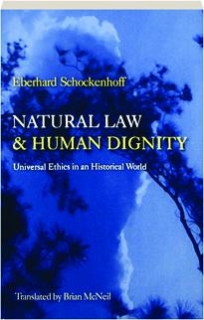 Our friend Monica Miller did some digging on the internet to find works by the German moral theologian Eberhard Schockenhoff, who is apparently on the German bishops' "A" list when it comes to advising them. She found the following items, which may be helpful in seeing what the Church is up against. His book, Natural Law and Human Dignity: Universal Ethics in an Historical World
Our friend Monica Miller did some digging on the internet to find works by the German moral theologian Eberhard Schockenhoff, who is apparently on the German bishops' "A" list when it comes to advising them. She found the following items, which may be helpful in seeing what the Church is up against. His book, Natural Law and Human Dignity: Universal Ethics in an Historical WorldHere's the publisher's summary of his book:
Do human rights apply only to a certain culture group or can they be demanded of all cultures and religions? This discussion about a common world ethos demonstrates how relevant and explosive that question is. In his study of ethical relativism and historical thinking, Eberhard Schockenhoff shows how the universal recognition of fundamental norms that guarantee the minimum conditions for human existence can be substantiated.Also see the related article by Giacomo Galeazzi, "The Church should grant communion to divorced and remarried persons" (Vatican Insider, June 4, 2015):
Dealing critically with the two most important branches of research in present-day moral theology―autonomous morality and teleological ethics―the author presents a new theological-ethical theory of natural law. Integrating the theory of practical reason and Aquinas' understanding of natural inclinations, Schockenhoff compares this synthesis to the insights of present-day anthropology. This method allows him to re-establish a connection to classical natural law ethics. In so doing, he indicates how ethics can fulfill its most important duty: to arrive at the recognition of anthropologically grounded material norms without falling prey to a logical error. According to Schockenhoff, claims of natural law and of human rights formulate an indispensable minimum, while biblical ethics (the decalogue and the Sermon of the Mount) and the high ethos of the worldreligions point the way to an encompassing realization of the concept of the good life.
Renowned moral theologian Eberhard Schockenhoff is professor at Albert-Ludwigs-Universität Freiburg. He is the author of numerous works and managing editor of Zeitschrift für Medizinische Ethik. Brian McNeil is a parish priest in Munich and a translator of theological literature.
"Divorced and remarried persons are entitled to receive communion." At the seminar in Salzburg by Austrian Catholic Action, the German theologian Eberhard Schockenhoff, a professor of moral theology at the University of Freiburg, has launched an appeal for a "theological re-evaluation " of divorced and remarried persons and a new way to interact with them by the Church. According to Schockenhoff, the Catholic news agency Adista reports, the Church must emphasize its readiness for reconciliation in the spirit of the biblical sources and the practice of the early Church, breaking away from an attitude of "moral condemnation" that provokes in the interested parties a "painful feeling of exclusion".And here is a PDF file of an article by Schockenhoff interpreting St. Thomas Aquinas, "The Theological Virtue of Charity (IIa IIae, qq. 23-46)," translated by Grant Kaplan and Frederick G. Lawrence, a chapter a book edited by Stephen J. Pope, entitled The Ethics of Aquinas
Benedict XVI himself admits that communion for divorced and remarried persons is an open question. He spoke about it in a meeting with the priests of the diocese of Aosta on July 25, 2005 and,more officially, in his speech to the Roman Rota, on 28 January 2006. Both times, the Pope urged them to "deepen" a particular case: the possible invalidity of a marriage in the Church celebrated without faith, for those who, having passed to a second union, have returned to the practice of Christian life and request communion. Read more >>

5 comments:
"Deeper understanding" of Tradition almost always means Tradition abandoned.
O,and name the man today who has a deeper understanding of Theology and Philosophy thad did St. Thomas Aquinas?
Yeah, I was surprised to see that too. From Benedict XVI no less. What the hell? How "deep" down that rabbit hole can they go?
But then, I remember him thinking that Teilhard was somehow "deep"!
c
Benedict was not the traditionalist many take him for. He believed in "essentializing" the truths of the faith, which meant using the same terminology by reducing them to an essential core that he felt was more compatible with modern man. In other words, modernism.
“the Pope urged them to ‘deepen’ a particular case: the possible invalidity of a marriage in the Church celebrated without faith, for those who, having passed to a second union, have returned to the practice of Christian life and request communion.”
“Deepen,” as if the Church of the preceding centuries treated the issue superficially. The vanity of their conceits always gives these jokers away. Even the “conservatives.”
Isn't there a limerick that ends "Were Tubingen a loo I would flush it"
Now that he has solved the problem of remarried Catholics, Schockenhoff may give his entire attention to rewording Transubstantiation into "self" instead of "body," thereby reaching what he REALLY wishes to get at.
Post a Comment